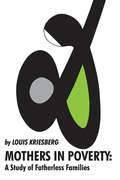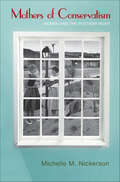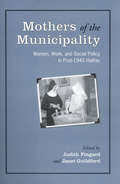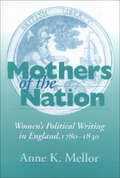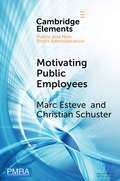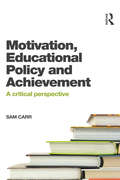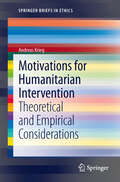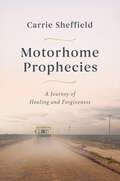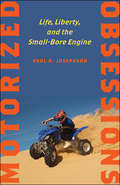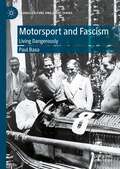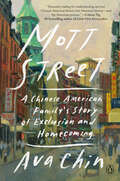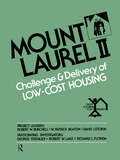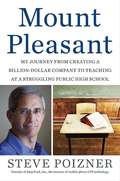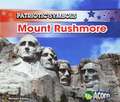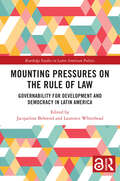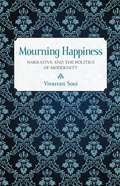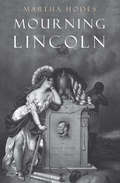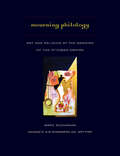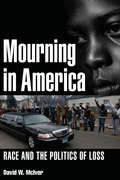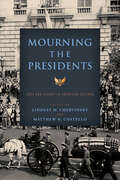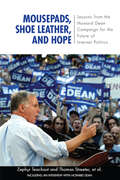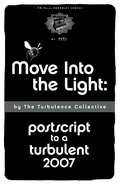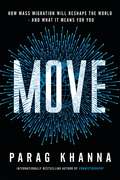- Table View
- List View
Mothers in Poverty: A Study of Fatherless Families
by F.G. BaileyProfessor Kriesberg explores in this book the many myths about the poor, the welfare dependents, and the husbandless mothers. The evidence marshalled does not support the idea that people continue on welfare generation after generation, that the children of broken families have disrupted marriages themselves, that the poor seek out public housing and public assistance because they prefer such dependency, or that husbandless mothers all have lower educational goals for their children than do married mothers. Beginning with major theoretical issues, Kriesberg developed hypotheses about the life of the poor and culture of poverty; the hypotheses were tested with data from a study of families in public housing projects.
Mothers of Conservatism: Women and the Postwar Right (Politics and Society in Modern America #106)
by Michelle M. NickersonMothers of Conservatism tells the story of 1950s Southern Californian housewives who shaped the grassroots right in the two decades following World War II. Michelle Nickerson describes how red-hunting homemakers mobilized activist networks, institutions, and political consciousness in local education battles, and she introduces a generation of women who developed political styles and practices around their domestic routines. From the conservative movement's origins in the early fifties through the presidential election of 1964, Nickerson documents how women shaped conservatism from the bottom up, out of the fabric of their daily lives and into the agenda of the Republican Party.A unique history of the American conservative movement, Mothers of Conservatism shows how housewives got out of the house and discovered their political capital.
Mothers of the Municipality
by Janet Guildford Judith FingardHighlighting women's activism in Halifax after the Second World War, Mothers of the Municipality is a tightly focused collection of essays on social policy affecting women. The contributors ? feminist scholars in history, social work, and nursing ? examine women's experiences and activism, including those of African Nova Scotian 'day's workers,' Sisters of Charity, St. John Ambulance Brigades, 'Voices' for peace, and social welfare bureaucrats.The volume underscores the fact that the 1950s and 60s were not simply years of quiet conservatism, born-again domesticity, and consumption. Indeed, the period was marked by profound and rapid change for women. Despite their almost total exclusion from the formal political arena, which extended into the tumultuous 1970s, women in Halifax were instrumental in creating and reforming programs and services, often amid controversy. Mothers of the Municipality explores women's activism and the provision of services at the community level. If the adage "think globally; act locally" has any application in modern history, it is with the women who fought many of the battles in the larger war for social justice.
Mothers of the Nation: Women's Political Writing in England, 1780–1830
by Anne K. MellorA survey of British women’s writings of the late eighteenth and early nineteenth centuries, and the revolutionary New Woman they promoted.British women writers were enormously influential in the creation of public opinion and political ideology during the years from 1780 to 1830. Anne Mellor demonstrates the many ways in which they attempted to shape British public policy and cultural behavior in the areas of religious and governmental reform, education, philanthropy, and patterns of consumption. She argues that the theoretical paradigm of the “doctrine of the separate spheres” may no longer be valid. According to this view, British society was divided into distinctly differentiated and gendered spheres of public versus private activities in the eighteenth and nineteenth centuries,Surveying all the genres of literature?drama, poetry, fiction, non-fiction prose, and literary criticism?Mellor shows how women writers promoted a new concept of the ideal woman as rationally educated, sexually self-disciplined, and above all, virtuous. This New Woman, these writers said, was better suited to govern the nation than were its current fiscally irresponsible, lecherous, and corruptible male rulers.Beginning with Hannah More, Mellor argues that women writers too often dismissed as conservative or retrogressive instead promoted a revolution in cultural mores or manners. She discusses writers as diverse as Elizabeth Inchbald, Hannah Cowley, and Joanna Baillie; as Charlotte Smith, Anna Barbauld, and Lucy Aikin; as Mary Wollstonecraft, Charlotte Reeve, and Anna Seward; and concludes with extended analyses of Charlotte Smith’s Desmond and Jane Austen’s Persuasion. She thus documents women writers’ full participation in that very discursive public sphere which Habermas so famously restricted to men of property. Moreover, the new career of philanthropy defined by Hannah More provided a practical means by which women of all classes could actively construct a new British civil society, and thus become the mothers not only of individual households but of the nation as a whole.“Intellectual and social historians (and not just feminists) have long believed that the late 18th and early 19th centuries in Britain saw an increasing separation of the male (public) and female (domestic) realms, with the result that the public sphere theorized by Jurgen Habermas and others to have emerged in the Enlightenment almost entirely excluded women. With energy, wit, and admirable command of her sources, Mellor . . . author of distinguished books on Romanticism . . . demonstrates that just the opposite was true: in the years around 1800, women became the primary producers and consumers of writing in Britain and vitally participated in the discursive public sphere—many arguing in their different ways for what Hannah More (the most popular author of the period) called a moral revolution in the national manners and principles. . . . [A] splendid survey of women novelists, poets, critics, playwrights, and social theorists . . . this bracing and important work of revision deserves a place in serious academic libraries serving both undergraduates and advanced scholars.” —D. L. Patey, Choice
Motivating Public Employees (Elements in Public and Nonprofit Administration)
by Marc Esteve Christian SchusterWhat motivates public employees to work hard? This Element systematically reviews answers from public administration research. The authors locate this research in a novel two-dimensional typology, which shows that public employees can be motivated for other- and self-interested reasons and extrinsic (motivated by outcomes) and intrinsic (motivated by work itself) reasons. Public administration research sheds significant light on extrinsic motivators: working hard to help society (public service motivation), one's organization (organizational commitment) and oneself (financial incentives). Future research should focus on hitherto understudied motivators: symbolic rewards and intrinsic motivators, such as enjoyable work tasks, warm glow, and relatedness with colleagues. Supplementary material for this Element is available online.
Motivation, Educational Policy and Achievement: A critical perspective
by Sam CarrMotivation, Educational Policy and Achievement seeks to theorise and critique current trends in education through the lens of key ideas from motivational theory. Its purpose is to argue that current educational trends on a macro level are a significant threat to the provision of classroom practices seeking to create an educational environment that motivational theorists would argue is best placed to develop motivational equality, optimal motivation, and wellbeing. Linking major contemporary theories of motivation to wider educational and political debate, this unique resource will bring about two major benefits: it will vocalise and mobilise the substantial research evidence from motivational theory in order to ensure that it contributes more explicitly to a critique of current neoliberal trends, and motivation researchers will be better positioned to move the theory forward in relation to what is happening in the real world of education. Areas covered include: developing a more critical space in relation to the field of motivational psychology and contemporary educational policy; linking motivational theory to education policy and broader social and political structures; the neoliberal educational landscape; an overview of achievement goal theory and self-determination theory. Motivation, Educational Policy and Achievement is a ‘wake-up call’ for educational practitioners and policy makers and essential reading for all advanced students and researchers in the fields of educational psychology and educational research.
Motivations for Humanitarian intervention
by Andreas KriegThis Brief sheds light on the motivation of humanitarian intervention from a theoretical and empirical point of view. An in-depth analysis of the theoretical arguments surrounding the issue of a legitimate motivation for humanitarian intervention demonstrate to what extent either altruism or national/self-interests are considered a righteous stimulus. The question about what constitutes a just intervention has been at the core of debates in Just War Theory for centuries. In particular in regards to humanitarian intervention it is oftentimes difficult to define the criteria for a righteous intervention. More than in conventional military interventions, the motivation and intention behind humanitarian intervention is a crucial factor. Whether the humanitarian intervention cases of the post-Cold War era were driven by altruistic or by self-interested considerations is a question is covered within and enables a comprehensive and holistic evaluation of the question of what motivates Western democracies to intervene or to abstain from intervention in humanitarian crises.
Motive für ein Freiwilliges Soziales Jahr aus biografischer Perspektive (Kasseler Edition Soziale Arbeit #25)
by Tim WersigDer Band untersucht die Motivbildung für ein Freiwilliges Soziales Jahr (FSJ) bei jungen Erwachsenen und Jugendlichen. Im Fokus der empirischen Auseinandersetzung stehen Lebensgeschichten und biografische Erzählungen derer, die ein Freiwilliges Soziales Jahr planen. Dabei wird untersucht, inwieweit explizite und implizite Motive für die Teilnahme am FSJ mit dem individuellen biografischen Erleben und Geschehen der Freiwilligen verknüpft sind. Zugleich wird analysiert, inwiefern unterschiedliche lebensgeschichtliche als auch lebensverlaufsbezogene Aspekte und Ereignisse sowie Sozialisationsinstanzen für die Motivbildung und Entscheidung für ein FSJ bedeutend erscheinen.
Motorhome Prophecies: A Journey of Healing and Forgiveness
by Carrie SheffieldIn the vein of Educated and Hillbilly Elegy comes a young woman&’s memoir chronicling her harrowing journey from despair to salvation that showcases the depths and resilience of the human spirit and empowers readers on their own paths toward healing, forgiveness, and redemption. Carrie Sheffield grew up fifth of eight children with a violent, mentally ill, street-musician father who believed he was a modern-day Mormon prophet destined to become U.S. president someday. She and her seven siblings were often forced to live as vagabonds, remaining on the move across the country. They frequently subsisted in sheds, tents, and, most notably, motorhomes. They often lived a dysfunctional drifter existence, camping out in their motorhome in Walmart parking lots. Carrie attended 17 public schools and homeschool, all while performing classical music on the streets and passing out fire-and-brimstone religious pamphlets—at times while child custody workers loomed. Carrie&’s father was eventually excommunicated from the official LDS Church, and she was the first of her siblings to escape the toxic brainwashing of his fundamentalist creed. Declared legally estranged from her parents, Carrie struggled with her mental health during college and for most of her adult life. But she eventually seized control of her life, transcended her troubled past, and overcame her toxic inner voice (and a near death experience)—thanks to the power of forgiveness, cultivated through her conversion to Christianity. She evolved from a scared and abused motorhome-dwelling girl to a Harvard-educated professional with a passion for empowering others to reject the cycles of poverty, depression, and self-hatred. Motorhome Prophecies is the story of Carrie&’s unbelievable, yet in many ways, very American journey. It resonates with those trapped in difficult situations and awes all who are enchanted by the depths and resilience of the human spirit.
Motorized Obsessions: Life, Liberty, and the Small-Bore Engine
by Paul R. Josephson2008 Outstanding Academic Title, Choice MagazineFrom dirt bikes and jet skis to weed wackers and snowblowers, machines powered by small gas engines have become a permanent—and loud—fixture in American culture. But fifty years of high-speed fun and pristine lawns have not come without cost.In the first comprehensive history of the small-bore engine and the technology it powers, Paul R. Josephson explores the political, environmental, and public health issues surrounding one of America's most dangerous pastimes. Each chapter tells the story of an ecosystem within the United States and the devices that wreak havoc on it—personal watercraft (PWCs) on inland lakes and rivers; all-terrain vehicles (ATVs) in deserts and forests; lawn mowers and leaf blowers in suburbia. In addition to environmental impacts, Josephson discusses the development and promotion of these technologies, the legal and regulatory efforts made to improve their safety and environmental soundness, and the role of owners' clubs in encouraging responsible operation.Synthesizing information from medical journals, recent environmental research, nongovernmental organizations, and manufacturers, Josephson's compelling history leads to one irrefutable conclusion: these machines cannot be operated without loss of life and loss of habitat.
Motorsport and Fascism: Living Dangerously (Global Culture and Sport Series)
by Paul BaxaThis book is the first English-language study of motorsport and Italian Fascism, arguing that a synergy existed between motor racing and Fascism that did not exist with other sports. Motorsport was able to bring together the two dominant, and often opposed, cultural roots of Fascism, the Futurism of F. T. Marinetti, and the Decadence associated with Gabriele D’Annunzio. The book traces this cultural convergence through a topical study of motorsport in the 1920s and 1930s placing it in the context of the history of sport under Mussolini’s regime. Chapters discuss the centrality of speed and death in Fascist culture, the attempt to transform Rome into a motorsport capital, the architectural and ideological function of the Monza and Tripoli and autodromes, and two chapters on the importance of the Mille Miglia, a genuine Fascist artefact that became one of the most legendary motor races of all time.
Mott Street: A Chinese American Family's Story of Exclusion and Homecoming
by Ava Chin&“Essential reading for understanding not just Chinese American history but American history—and the American present.&” —Celeste Ng, #1 bestselling author of Little Fires Everywhere* TIME 100 Must-Read Books of 2023 * San Francisco Chronicle's Favorite Nonfiction * Kirkus Best Nonfiction of 2023 * Library Journal Best Memoir and Biography of 2023 * One of Elle's Best Memoirs of 2023 (So Far) * An ALA Notable Book *&“The Angela&’s Ashes for Chinese Americans.&” —Miwa Messer, Poured Over podcastAs the only child of a single mother in Queens, Ava Chin found her family&’s origins to be shrouded in mystery. She had never met her father, and her grandparents&’ stories didn&’t match the history she read at school. Mott Street traces Chin&’s quest to understand her Chinese American family&’s story. Over decades of painstaking research, she finds not only her father but also the building that provided a refuge for them all.Breaking the silence surrounding her family&’s past meant confronting the Chinese Exclusion Act of 1882—the first federal law to restrict immigration by race and nationality, barring Chinese immigrants from citizenship for six decades. Chin traces the story of the pioneering family members who emigrated from the Pearl River Delta, crossing an ocean to make their way in the American West of the mid-nineteenth century. She tells of their backbreaking work on the transcontinental railroad and of the brutal racism of frontier towns, then follows their paths to New York City.In New York&’s Chinatown she discovers a single building on Mott Street where so many of her ancestors would live, begin families, and craft new identities. She follows the men and women who became merchants, &“paper son&” refugees, activists, and heads of the Chinese tong, piecing together how they bore and resisted the weight of the Exclusion laws. She soon realizes that exclusion is not simply a political condition but also a personal one.Gorgeously written, deeply researched, and tremendously resonant, Mott Street uncovers a legacy of exclusion and resilience that speaks to the American experience, past and present.
Mount Laurel II
by Richard L. Florida David Listokin Robert W. Lake Robert W. Burchell George Sternlieb W. Patrick BeatonMount Laurel II is a historic state supreme court decision which mandates that all new residential development include housing for low- and moderate-income families. This study provides a rational approach to low-cost housing. Methods for defining housing market areas are given, as well as demand and supply projection techniques. Housing cost reduction alternatives and allocation approaches are detailed. It elaborates step-by-step methodologies with operational baselines, data framework, and alternative approaches.The Potential of Zoning and Subdivision Controls, What Housing is Affordable - And by Whom, Fair Share Allocation Procedures.
Mount Pleasant: My Journey from Creating a Billion-dollar Company to Teaching at a Struggling Public High School
by Steve PoiznerA Silicon Valley entrepreneur takes on the challenge of a lifetime: teaching in one of California's toughest high schools. Entrepreneur Steve Poizner has run a billion dollar company, but the greatest challenge of his life was the year he spent teaching twelfth graders at San Jose's Mt. Pleasant High School. On many days, like the one when a student's boyfriend was arrested for bank robbery, his managerial and entrepreneurial skills seemed irrelevant. But on others, they helped him demonstrate how exciting it is to learn. Playing Jeopardy with the class and inviting speakers into the classroom, Poizner motivated his students by expanding their horizons far beyond their high school's walls. Steve Poizner is currently a candidate for governor of California and on the verge of becoming a household name. But this is a memoir of a riveting personal journey, not a point-by-point account of his vision for his state. Poizner writes, "Often I came to ask myself one question: What exactly are you doing here? As it turns out, I was receiving one hell of an education. " Mt Pleasant is ultimately a success story, as Poizner wins Rookie Teacher of the Year honors and, more important, ensures that all his students graduate.
Mount Rushmore (Patriotic Symbols Ser.)
by Nancy HarrisProvides a general overview of what Mount Rushmore means as a symbol.
Mount Vernon (Cornerstones of Freedom)
by Mary CollinsDescribes the history of the Virginia estate that was home to this country's first president and is now maintained as a national landmark.
Mounting Pressures on the Rule of Law: Governability for Development and Democracy in Latin America (Routledge Studies in Latin American Politics)
by Edited by Jacqueline Behrend and Laurence WhiteheadThis important book offers an original perspective on the rule of law, development, and democracy in Latin America, establishing a new approach in recognizing the realities of political economy as opposed to merely structural and institutional factors.With contributions from an international team of experts, the book outlines the main challenges that have arisen in the pursuit of a developmental agenda in the region, including subnational variations, state capture by local elites, variations in state capacity, border divergence from centrally designed perspectives, environmental conflicts, uneven access to justice and the role of international organizations. In doing so, the book explores the democratic and developmental implications of conflicts over the rule of law and its application, uneven enforcement, and state capture.Whether a reference tool for the seasoned scholar, a guide aiding practitioner's individual expertise or an introduction to students interested in the complex intersections between the rule of law, development and democracy, this book is a must-have for any library.
Mourning Happiness: Narrative and the Politics of Modernity
by Vivasvan SoniFor many eighteenth-century thinkers, happiness was a revolutionary new idea filled with the promise of the Enlightenment. However, Vivasvan Soni argues that the period fails to establish the importance of happiness as a guiding idea for human practice, generating our modern sentimental idea of happiness. Mourning Happiness shows how the eighteenth century's very obsession with happiness culminates in the political obsolescence of the idea. Soni explains that this puzzling phenomenon can only be comprehended by studying a structural transformation of the idea of happiness at the level of narrative form. Happiness is stripped of its ethical and political content, Soni demonstrates, when its intimate relation to narrative is destroyed. This occurs, paradoxically, in some of the most characteristic narratives of the period: eighteenth-century novels including Pamela, The Vicar of Wakefield, and Julie; the pervasive sentimentalism of the time; Kant's ethics; and the political thought of Rousseau and Jefferson. For Soni, the classical Greek idea of happiness epitomized by Solon's proverb "Call no man happy until he is dead" opens the way to imagining a properly secular conception of happiness, one that respects human finitude and mortality. By analyzing the story of Solon's encounter with Croesus, Attic funeral orations, Greek tragedy, and Aristotle's ethics, Soni explains what it means to think, rather than feel, a happiness available for public judgment, rooted in narrative, unimaginable without a relationship to community, and irreducible to an emotional state. Such an ideal, Soni concludes, would allow for a radical reenvisioning of a politics that takes happiness seriously and responds to our highest aspirations rather than merely keeping our basest motivations in check.
Mourning Lincoln
by Martha HodesA historian examines how everyday people reacted to the president&’s assassination in this &“highly original, lucidly written book&” (James M. McPherson, author of Battle Cry of Freedom). The news of Abraham Lincoln&’s assassination on April 15, 1865, just days after Confederate surrender, astounded a war-weary nation. Massive crowds turned out for services and ceremonies. Countless expressions of grief and dismay were printed in newspapers and preached in sermons. Public responses to the assassination have been well chronicled, but this book is the first to delve into the personal and intimate responses of everyday people—northerners and southerners, soldiers and civilians, black people and white, men and women, rich and poor. Exploring diaries, letters, and other personal writings penned during the spring and summer of 1865, historian Martha Hodes captures the full range of reactions to the president&’s death—far more diverse than public expressions would suggest. She tells a story of shock, glee, sorrow, anger, blame, and fear. &“&’Tis the saddest day in our history,&” wrote a mournful man. It was &“an electric shock to my soul,&” wrote a woman who had escaped from slavery. &“Glorious News!&” a Lincoln enemy exulted, while for the black soldiers of the Fifty-Fourth Massachusetts, it was all &“too overwhelming, too lamentable, too distressing&” to absorb. Longlisted for the National Book Award, Mourning Lincoln brings to life a key moment of national uncertainty and confusion, when competing visions of America&’s future proved irreconcilable and hopes for racial justice in the aftermath of the Civil War slipped from the nation&’s grasp. Hodes masterfully explores the tragedy of Lincoln&’s assassination in human terms—terms that continue to stagger and rivet us today.
Mourning Philology: Art and Religion at the Margins of the Ottoman Empire
by Marc Nichanian“Pagan life seduces me a little more with each passing day. If it were possible today, I would change my religion and would joyfully embrace poetic paganism,” wrote the Armenian poet Daniel Varuzhan in 1908. During the seven years that remained in his life, he wrote largely in this “pagan” vein. If it was an artistic endeavour, why then should art be defined in reference to religion? And which religion precisely? Was Varuzhan echoing Schelling’s Philosophy of Art?Mourning Philology draws on Varuzhan and his work to present a history of the national imagination, which is also a history of national philology, as a reaction to the two main philological inventions of the nineteenth century: mythological religion and the native. In its first part, the book thus gives an account of the successive stages of orientalist philology. The last episode in this story of national emergence took place in 1914 in Constantinople, when the literary journal Mehyan gathered around Varuzhan the great names to come of Armenian literature in the diaspora
Mourning in America: Race and the Politics of Loss
by David W. McivorRecent years have brought public mourning to the heart of American politics, as exemplified by the spread and power of the Black Lives Matter movement, which has gained force through its identification of pervasive social injustices with individual losses. The deaths of Sandra Bland, Michael Brown, Freddie Gray, Trayvon Martin, Tamir Rice, Walter Scott, and so many others have brought private grief into the public sphere. The rhetoric and iconography of mourning has been noteworthy in Black Lives Matter protests, but David W. McIvor believes that we have paid too little attention to the nature of social mourning—its relationship to private grief, its practices, and its pathologies and democratic possibilities.In Mourning in America, McIvor addresses significant and urgent questions about how citizens can mourn traumatic events and enduring injustices in their communities. McIvor offers a framework for analyzing the politics of mourning, drawing from psychoanalysis, Greek tragedy, and scholarly discourses on truth and reconciliation. Mourning in America connects these literatures to ongoing activism surrounding racial injustice, and it contextualizes Black Lives Matter in the broader politics of grief and recognition. McIvor also examines recent, grassroots-organized truth and reconciliation processes such as the Greensboro Truth and Reconciliation Commission (2004–2006), which provided a public examination of the Greensboro Massacre of 1979—a deadly incident involving local members of the Communist Workers Party and the Ku Klux Klan.
Mourning the Presidents: Loss and Legacy in American Culture (Miller Center Studies on the Presidency)
by Lindsay M. Chervinsky Matthew R. CostelloThe death of a chief executive, regardless of the circumstances—sudden or expected, still in office or decades later—is always a moment of reckoning and reflection. Mourning the Presidents brings together renowned and emerging scholars to examine how different generations and communities of Americans have eulogized and remembered US presidents since George Washington’s death in 1799. Over twelve individually illuminating chapters, this volume offers a unique approach to understanding American culture and politics by uncovering parallels between different generations of mourners, highlighting distinct experiences, and examining what presidential deaths can tell us about societal fissures at various critical points in the nation’s history, right up to the present moment.
Mousepads, Shoe Leather, and Hope: Lessons from the Howard Dean Campaign for the Future of Internet Politics (Media and Power)
by Thomas Streeter Zephyr TeachoutHoward Dean's campaign for president changed the way in which campaigns are run today. With an unlikely collection of highly talented and motivated staffers drawn from a variety of backgrounds, the Dean campaign transformed the way in which money was raised and supporters galvanized by using the Internet. Surprisingly, many of the campaign staff members were neither computer whizzes nor practiced political operatives, even though that is how some of them are identified today. This book allows key individuals in the campaign the chance to tell their stories with an eye to documenting the Internet campaign revolution and providing lessons to future campaigns. Howard Dean's inspirational statement of what it took for his campaign to get as far as it did-"mousepads, shoe leather, and hope"-holds great wisdom for anyone campaigning today, especially the 2008 presidential candidates.
Move into the Light: Postscript to a Turbulent 2007 (PM Pamphlet)
by Turbulence CollectiveWhether it's the G8 summit at Heiligendamm or experiments in Latin America, the politics of climate change or uprisings in the French banlieues, questions of visibility and illumination crop up again and again. But our experiences create their own luminosity, and their own areas of darkness. How can we overcome our night-blindness once we move beyond the familiar?
Move: How Mass Migration Will Reshape the World – and What It Means for You
by Parag KhannaWhere will you live in 2030? Where will your children settle in 2040? What will the map of humanity look like in 2050?In the 60,000 years since people began colonising the continents, a recurring feature of human civilisation has been mobility - the constant search for resources and stability. Seismic global events - wars and genocides, revolutions and pandemics - have only accelerated the process. The map of humanity isn't settled, not now, not ever.As climate change tips toward full-blown crisis, economies collapse, governments destabilise and technology disrupts, we're entering a new age of mass migrations - one that will scatter both the dispossessed and the well-off. Which areas will people abandon and where will they resettle? Which countries will accept or reject them? As today's world population, which includes four billion restless youth, votes with their feet, what map of human geography will emerge?Here global strategy advisor Parag Khanna provides an illuminating and authoritative vision of the next phase of human civilisation - one that is both mobile and sustainable. As the book explores, in the years ahead people will move to where the resources are and technologies will flow to the people who need them, returning us to our nomadic roots while building more secure habitats. Move is a fascinating look at the deep trends that are shaping the most likely scenarios for the future. Most importantly, it guides each of us as we determine our optimal location on humanity's ever-changing map.
